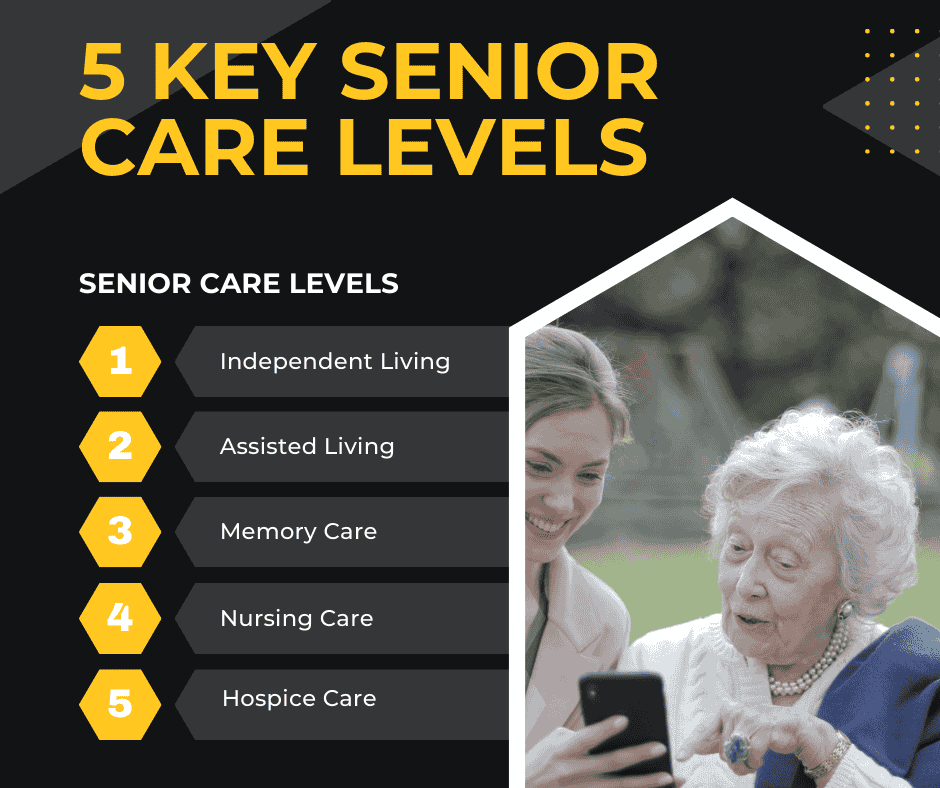- (248)952-8187
- info@findcarez.com
- 8519 PERRY RD.,# 233 ATLAS, MI 48411
Navigating the 5 Key Senior Care Levels

Navigating the 5 Key Senior Care Levels
As the global population continues to age, the demand for senior care has grown significantly. With this, understanding the various levels of care available to seniors is essential for making informed decisions regarding the well-being of our loved ones. Whether you're exploring options for yourself or someone else, understanding the differences between care levels such as Independent Living, Assisted Living, Memory Care, Skilled Nursing, and Hospice Care can significantly impact both quality of life and financial well-being.
In this article, we will explore the five most common levels of senior
care and how to choose the right one for your loved one. We will cover each
level in detail, offer guidance on making the best choice, and answer
frequently asked questions to guide you through this important process.
Section 1: The Importance of Choosing
the Right Senior Care Level
Choosing the right level of care for your loved one is crucial, as it
directly impacts their quality of life, financial health, and emotional
well-being. The right decision can ensure that your loved one is comfortable,
secure, and properly cared for, while the wrong choice can lead to unnecessary
stress, increased costs, or even a decline in health.
Benefits of Early Planning:
- Early research and planning allow
families to find the most appropriate care before a crisis arises.
- A proactive approach helps avoid
hasty decisions and ensures the senior's preferences are taken into
account.
- It also helps balance financial
health, as many senior care options can be expensive and require long-term
commitments.
Quick Comparison of Care Levels:
- Independent Living is ideal for seniors who are
self-sufficient but seek social interaction and assistance with some daily
tasks.
- Hospice Care is specifically for seniors at
the end of life, focusing on comfort and dignity rather than curative
treatments.
Section 2: Level 1 – Independent
Living
Definition: Independent Living is designed for seniors who are largely
self-sufficient but prefer living in a community with social opportunities and
access to support services. These communities offer independent living
arrangements with amenities such as housekeeping, transportation, and dining,
but do not provide medical or personal care.
Key Features:
- No personal care services.
- Amenities like housekeeping,
meals, transportation, and social activities.
- Residents live in private
apartments or homes.
Ideal Candidates:
- Active seniors who can manage
most daily tasks independently but want the benefits of socialization and
convenience.
Pros:
- Promotes independence.
- Provides a social environment
with opportunities for activities and events.
- More affordable compared to
higher levels of care.
Cons:
- No medical or personal care
support.
- May require transition to a
higher level of care as health needs change.
Section 3: Level 2 – Assisted Living
Definition: Assisted Living is designed for seniors who need help with activities of
daily living (ADLs) like bathing, dressing, and medication management but do
not require 24-hour medical supervision. It strikes a balance between
independence and support.
Key Features:
- Assistance with ADLs.
- Social activities and meals
included.
- Health monitoring and medication
management.
Ideal Candidates:
- Seniors who require some help
with daily tasks but do not need round-the-clock medical care.
Pros:
- A balance between independence
and assistance.
- Social activities and meals are
provided.
- Often more affordable than
skilled nursing or memory care.
Cons:
- Limited flexibility in care
options.
- May not be suitable for those who
need extensive medical supervision.
Section 4: Level 3 – Memory Care
Definition: Memory Care is a specialized form of care for seniors with Alzheimer's,
dementia, or other cognitive impairments. This level of care provides 24-hour
supervision and tailored therapies to address cognitive decline and ensure
safety.
Key Features:
- 24-hour supervision to ensure
safety.
- Cognitive therapies and
memory-enhancing activities.
- Secure environments to prevent
wandering.
Ideal Candidates:
- Seniors with Alzheimer's,
dementia, or other forms of cognitive impairment.
Pros:
- Specialized care for seniors with
memory loss.
- Ensures safety with monitored
environments.
- Tailored activities to stimulate
cognitive function.
Cons:
- Higher cost due to specialized
care.
- May offer limited social
opportunities due to the focus on safety and care.
Section 5: Level 4 – Skilled Nursing
(Nursing Homes)
Definition: Skilled Nursing, also known as nursing home care, provides 24-hour
medical care and supervision. This level is designed for seniors who need
continuous medical attention due to chronic illnesses, disabilities, or
recovery from surgery.
Key Features:
- 24-hour medical care,
rehabilitation services, and specialized treatments.
- Assistance with ADLs and medical
monitoring.
Ideal Candidates:
- Seniors with serious medical
conditions, disabilities, or those recovering from surgery who require
skilled medical attention.
Pros:
- Round-the-clock medical care and
rehabilitation.
- Specialized care for seniors with
complex health needs.
Cons:
- Higher cost due to medical
services and staff.
- Less independence for residents.
Section 6: Level 5 – Hospice Care
Definition: Hospice Care focuses on providing comfort and dignity to seniors who are
in the final stages of a terminal illness. It emphasizes pain management and
emotional, psychological, and spiritual support for both the senior and their
family members.
Key Features:
- Palliative care, pain management,
and emotional support.
- Focus on comfort rather than
curative treatments.
- In-home or facility-based
options, depending on the senior’s condition.
Ideal Candidates:
- Seniors with terminal illnesses
or those who are in the final stages of life.
Pros:
- Provides peace and comfort for
end-of-life care.
- Family support is provided
throughout the process.
- Focus on quality of life and
dignity.
Cons:
- Limited to individuals with
terminal conditions.
- Does not focus on cure or medical
interventions.
Section 7: How to Choose the Right
Senior Care Level for Your Loved One
Factors to Consider:
- Physical and Mental Health: The senior's current health
status and need for medical or personal care.
- Social Needs: Consider how important
socialization is and whether the senior would benefit from a more
community-oriented environment.
- Financial Considerations: Different care levels come with
different costs, and it is important to assess what is affordable.
- Family Involvement: Ensure family members are
involved in the decision-making process to ensure everyone’s concerns are
addressed.
Step-by-Step Guide:
- Assess the Senior’s Health: Evaluate the senior's physical,
mental, and emotional needs.
- Evaluate Financial Capacity: Understand the costs associated
with each level of care and choose what fits within your budget.
- Consider Independence vs.
Assistance: Determine whether the senior requires full independence or
assistance with daily activities.
- Visit Potential Facilities: Take tours and consult with
staff to see how the facility meets your loved one’s needs.
- Involve Family: Gather input from family
members to ensure all perspectives are considered in the decision-making
process.
Section 8: Common Questions About
Senior Care Levels
Q: What is the cost difference between independent living and skilled
nursing care?
- Independent living is typically
more affordable, with costs ranging from $1,500 to $4,000 per month, while
skilled nursing care can range from $6,000 to $10,000 or more.
Q: Can a senior transition from one care level to another?
- Yes, many facilities allow
seniors to transition from one level of care to another as their needs
change.
Q: Are medical needs covered in Assisted Living?
- Assisted living provides limited
medical care, such as medication management and basic health monitoring,
but not 24-hour medical care.
Q: Is Hospice Care only available at the end of life, or can it be used
earlier?
- Hospice care is specifically for
terminally ill individuals, but palliative care services can be provided
earlier for seniors with chronic illnesses.
Q: How do I know if a senior needs memory care or just extra help with
daily tasks?
- If a senior shows signs of
cognitive decline, such as forgetfulness or confusion, memory care might
be appropriate. Assisted living can help with daily tasks if the senior
does not have significant cognitive issues.
Section 9: Resources to Help You
Navigate Senior Care
For more detailed information about senior care options, visit FindCarez.com,
your one-stop shop for everything related to senior care. Whether you are
searching for information on senior care facilities, lawyers specializing in
senior care, senior care products, or caregiving jobs, FindCarez.com offers
comprehensive resources to help guide your decision.
Other helpful directories include findcarez.com,
where you can find comparisons, and recommendations for care facilities in your
area.
Conclusion
Understanding the five levels of senior care—Independent Living, Assisted
Living, Memory Care, Skilled Nursing, and Hospice Care—is vital for ensuring
that your loved one receives the proper care for their needs. The right choice
will depend on factors such as health, financial situation, and personal
preferences. By considering these factors and utilizing resources like FindCarez.com, and findseniorsliving.com you can make an
informed decision that will lead to the best outcome for your loved one.
Call to Action
Visit FindCarez.com, findseniorsliving.com today to
explore a wide range of senior care options, connect with care facilities, and
find the resources you need to make the best choice for your loved one’s care.
Whether you're seeking information, caregiving services, or care products,
FindCarez.com has everything you need in one place.
FAQs
- What is the difference between
Assisted Living and Memory Care?
Assisted Living provides help with daily tasks but doesn’t specialize in
dementia care, while Memory Care is specifically designed for those with
Alzheimer's or dementia.
- How much does Hospice Care cost?
Hospice care costs can vary, but many services are covered by Medicare
for eligible individuals, making it an affordable option for families.
- Can a senior in Independent
Living move to Assisted Living if needed?
Yes, many communities offer multiple levels of care, so seniors can
transition as their needs change.
- What factors determine whether a
senior needs Skilled Nursing?
Seniors with complex medical needs, including chronic illnesses or those
recovering from surgery, may require Skilled Nursing.
- Is there financial assistance for
senior care?
Some senior care services may be covered by Medicare, Medicaid, or
long-term care insurance. Financial assistance varies based on location and
eligibility.
- Can I visit a senior care
facility before making a decision?
Yes, visiting facilities and talking to staff is highly recommended to
assess if the environment is suitable for your loved one.
- What should I ask when touring a
senior care facility?
Ask about staff-to-resident ratios, activities offered, meal plans, and
the cost of care. It’s also important to inquire about transition options
between care levels.
- How can I tell if my loved one is
ready for a Memory Care facility?
Signs include forgetfulness, confusion, difficulty with daily tasks, or
wandering. Consult with a healthcare professional to determine if Memory Care
is needed.
- What is the difference between
Palliative Care and Hospice Care?
Palliative Care is focused on comfort and symptom management for people
with serious illnesses but can be provided alongside curative treatments, while
Hospice Care is for those nearing the end of life.
- How do I choose between Assisted
Living and Skilled Nursing?
Consider the level of medical care needed. If your loved one requires 24-hour medical care, Skilled Nursing is the better option. If they only need assistance with daily tasks, Assisted Living is more appropriate.



